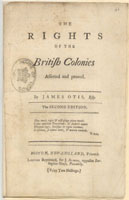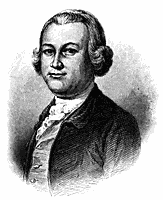Why
do we study history at BHI? Because we want to know
where we are going. Consider the following example:
In 1761, there was a lawyer in Boston by the name of
James Otis.
As an
Advocate General in the
Vice Admiralty Court, part of
Otis’ job was the prosecution of outlaw smugglers, a
large problem in the Colonies. When the Crown decided to
assert their power and get control of the smuggling
situation, they introduced the Writs of Assistance.
These Writs allowed customs officers to search people’s
homes, ships and stores without a warrant. Otis was not
in any way pro-smuggler, but he knew that these new
writs were clearly contrary to the rights of a British
Citizen.
Now back
to the present. In the days before the 2007
recess, Congress has been passing rapid fire legislature
like a 6th grader slamming out his last math
questions before the school bell rings. In the flurry of
activity, a bill was passed that was not well debated,
or possibly even well read. Congress, in an effort to
improve our national intelligence gathering abilities,
granted broad new surveillance options to the Executive
Branch.
These options could include physical searches of
American citizens here on US soil, the collection of Americans
business records, and extended wiretapping--all
without court approval. That is contrary to the
Constitution’s 4th amendment, which says,
“The right of the people to be secure in their persons,
houses, papers, and effects, against unreasonable
searches and seizures, shall not be violated, and no
warrants shall issue, but upon probable cause, supported
by oath or affirmation, and particularly describing the
place to be searched, and the persons or things to be
seized.” The White House emphasized that there would be
strict rules in place to minimize the extent to which
Americans would be caught up in the surveillance. Note:
they said “There will be strict rules”, not there
are strict rules.

|

In 1761,
Otis went against the Crown (his employer and
government) and argued for Boston Merchants that the
Writs of Assistance violated the “natural” rights of the
colonist. This argument would be made again 15 years
later by Thomas Jefferson in the Declaration Of
Independence and was the beginning of what would be the
4th Amendment. Otis became the first to
explore the idea that British subjects in
America
were not being given their full rights as English
Citizens. Later, Otis would be central in the forming of
the Sons of Liberty in Boston,
and even joined the fight at
Breed’s Hill. After Otis’ death, John Adams
had this to say about him: "I have been young and now I
am old, and I solemnly say I have never known a man
whose love of country was more ardent or sincere, never
one who suffered so much, never one whose service for
any 10 years of his life were so important and essential
to the cause of his country as those of Mr. Otis from
1760 to 1770."
In 2007, we need a new James Otis; better yet, we
need many.
Let’s assume that we all trust the President with these
sweeping new powers. Do we trust everyone that works for
the President not to abuse these new powers? Or how
about everyone that works for the people who work for
the President? How about a future President not yet
elected and their administration? Or what about the fact
that, even if you do trust all these people, the new
powers are just plain contrary to our Constitution?
You remember the Constitution, right? Those fancy
papers under glass at the National Archives?
Citizens, we have been down this road before.
At Breed’s Hill Institute we focus on educating
people about our nation’s founding history. Simply put,
we try to remind people of who we are and where we come
from as a society. Our mission is to preserve American
liberty through education, because only through
understanding liberty and the struggles to establish and
keep it can we expect to appreciate and preserve it. The
Revolutionary War ended in 1783, but the Revolution
itself continues.
We must all continue the fight.
|
|
The liberties of our country, the freedom of our civil
constitution, are worth defending at all hazards; and it
is our duty to defend them against all attacks. We have
received them as a fair inheritance from our worthy
ancestors; they purchased them for us with toil and
danger and expense of treasure and blood. It will bring
an everlasting mark of infamy on the present generation,
enlightened as it is, it we should suffer them to be
wrested from us by violence without a struggle, or be
cheated out of them by the artifices of false and
designing men."
-- Samuel Adams
Donate Today
Breeds Hill Institute 1636 N. Gymkhana Orange CA 92869 |